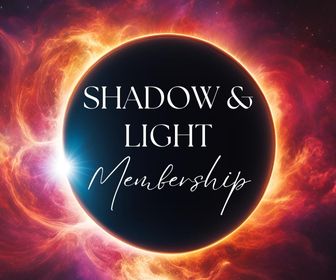It all added up. Sensitivity to loud sounds, harsh light, emotional climates, and over-stimulating situations? I’d just discovered something amazing: I’m a highly sensitive person.
For years, since childhood, I had always believed there was something terribly weird, different, strange, or broken about me.
New situations easily overwhelmed me. Strangers set me on edge. Loud sounds made me jump out of my skin. And even the slightest amount of coffee or alcohol sent me into a tailspin.

Spiritual Wanderer Course:
Being a lone wolf and a spiritual wanderer is a sacred calling in life – a unique and alchemical path of awakening. You don’t need to feel lost, alone, or stuck on your journey any more. It’s time to meet your soul’s deep needs for clarity, self-acceptance, and empowerment. Let us show you how …
If you can relate to this level of sensitivity, you might be a highly sensitive person.
The life-changing reality of this label is that it helps you to accept that (1) you’re not crazy, (2) there’s nothing wrong with you, and (3) you’re not alone.
Table of contents
What is a Highly Sensitive Person?

Highly sensitive people (HSPs) are individuals who are genetically predisposed to higher levels of mental, emotional, and physical sensitivity. It is speculated that around 15-20% of our population is wired differently and therefore experiences life in a much more intense way than the average person. HSPs differ from neurotypical individuals in that they are more deeply impacted by sights, sounds, smells, tastes tactile sensations, and emotions.
19 Signs You’re a Highly Sensitive Person

Mother of the discovery, Elaine Aron, has been researching the highly sensitive person for over 20 years now. As such, she has a finely tuned list of traits and behavioral quirks that define the highly sensitive person. I’ve refined some of these traits below. See how many you can relate to:
- I’m aware of subtleties and nuances in different environments, e.g., a tap dripping too loudly, a light bulb burning too brightly, etc.
- I’m easily overwhelmed by the senses. Loud noises, strong smells, tastes, and light affect me negatively, e.g., the pounding music of nightclubs, loud busy freeways, and strong perfumes.
- I need to withdraw from busy days and take a break, or a nap, by myself.
- I’m overly sensitive to pain, e.g. needles, sports injuries, insect stings, etc.
- I become spooked and startled easily.
- I like to take my time, and not overload myself with too many activities as it drains and overwhelms me.
- I prefer to avoid violent TV shows and movies.
- I find it hard to adapt to changes in my life.
- I tend to ruminate and process information deeply.
- I’m empathic. I’m aware of the way people feel around me, and when any slight change occurs in them.
- Emotional environments tend to affect me deeply.
- I’m often perceived as being introverted or shy.
- I’m profoundly moved by nature, the arts or music.
- I tend to be more philosophically and spiritually-orientated.
- I feel unusually strong emotions.
- I avoid and deeply dislike confrontation of any kind.
- I prefer to not be observed when fulfilling tasks: it unsettles me.
- I tend to avoid situations that are too intense or chaotic.
- I seem to process the world at a very deep level.
How many of these qualities did you say “yes” to? I’d love to hear in the comments!
HSPs, Emotional Intensity, and Giftedness

Perhaps one of the defining qualities of being an HSP is how emotionally intense we are.
We feel everything in an intense, passionate, and sometimes devastating way. This intensity often leads us to become artists, visionary leaders, innovators, mentors, healers, and therapists.

Shadow & Light Membership:
⭐️⭐️⭐️⭐️⭐ "Receiving these messages is a beacon of light and hope for me in currently very challenging times. The words of wisdom speak right to my soul, guiding and encouraging me further on my path. I highly recommend Shadow & Light to everyone who seeks to develop and cultivate a relationship with the Inner Self." – Karin
But this is a bittersweet trait we share because while it helps us to live life with passion and intensity, it can also isolate us. We may be misunderstood, criticized, underpaid, undervalued, taken for granted, alienated, and generally perceived as being “too much.” We may be classified as neurotic, melodramatic, thin-skinned, or generally finicky – and mistreated because of it.
Yet, despite the many challenges we face, our intensity and giftedness as highly sensitive people also opens the doorway to potentially transcendent and cosmic adventures. For example, many people who are highly sensitive undergo spiritual awakenings and various mystical experiences. Because we are naturally sensitive and more in-tune with the undercurrents of life, we often find ourselves having paradigm-shifting insights about the nature of reality.
In fact, many highly sensitive people are also naturally gifted empaths and old souls who gravitate toward various spiritual pursuits that explore the meaning of life and how to experience spiritual Oneness.
Regardless of whether you’re spiritually-inclined or not, you will have the insatiable need to live authentically and find your true purpose.
Common Myths About the Highly Sensitive Person

As with any neuroatypical group, HSPs deal with their fair share of misguided judgments. Here are the three most common misconceptions about HSPs:
Myth #1: HSPs are introverts
HSPs and introverts both reflect deeply and have rich inner worlds – but not all HSPs are introverted, and vice versa. In fact, as Aron points out, 30% of the total number of highly sensitive people are actually extroverted. It’s a smaller number, but it still shows that introversion does not always equate to being highly sensitive.
Myth #2: Being an HSP is just another word for being shy
Just like introverts, highly sensitive people are often mislabeled as being shy. Although the two share things in common – such as sensitivity to overwhelming social situations – they are not the same thing. While shyness is learned, being a highly sensitive person is not.
Myth #3: “HSP” is a mental disorder
For some, it can be easy to mistake the highly sensitive person as a sufferer of some strange mental condition. Although some HSPs possess separate mental illnesses, being sensitive does not automatically make someone mentally ill. Instead, sensitivity is a trait, a gift even, that some people possess and others don’t. Besides, what pathological mental disorder allows the sufferer to be endowed with such genuine joys as being more empathic, spiritually-orientated, and appreciating the details of life more fully?
How to Survive as an HSP

Due to their sensitive nature, highly sensitive people are prone to idealism and perfectionism. This often stems from deriving our self-worth from the opinion of others, and not valuing ourselves enough. (And the self-worth issues we often develop are due to not being appreciated or understood throughout life.)
Also, being a highly sensitive person can hit you hard if you’re a male. Being a thick-skinned logician is favored as the masculine ideal in the Western world, rather than the sensitive, emotional poet. But whatever difficulties we face as highly sensitive people can be overcome with the ability to reframe the negative into the positive, and actively work to better our environments. Here are some tips:
Would you like to save this?
Your information will never be shared.
1. Learn to value yourself
I learned this the hard way. When we place too much importance on what people say and think about us, we create immense psychological tension and anxiety. We are living to satisfy the thousands of different perspectives of who we “should” be, rather than embracing what we are. In essence, we are creating the exact thing we try to avoid that is detrimental to us: too much internal pressure and chaos. So be nice to yourself. Learn to value your qualities and gifts. Realize that you’re the one and only master over yourself, and no one can have power over you unless you let them.
2. Don’t take things personally
This tip, mentioned by Don Miguel Ruiz in his well-known book The Four Agreements, is essential for mental and emotional happiness.
The highly sensitive person is prone to get hurt easily by other people and their words. Consequently, we frequently find ourselves on-edge in social situations, trying to finely tune our behavior to avoid conflict.
When we take the insults and the moods of other people personally, we blame ourselves. We think that somehow we’re responsible, even deserve their abuse, but we’re not and we don’t.
To overcome the dilemma of taking things personally, try looking beyond your feelings. Use your ability to analyze instead and think to yourself, “I wonder what type of pain this person is suffering to treat me that way?” For example, perhaps they had a really bad day? Perhaps they’re going through a divorce? Perhaps they got triggered? Perhaps they had bad sleep?
When we ask these “why?” questions, we go beyond the initial sting of being mistreated and realize that ultimately, how people treat us is a reflection of them, not us. As Don Miguel Ruiz says, “nothing other people do is because of you.“
3. Embrace solitude
Solitude is not loneliness, instead, it is a chosen form of being alone, rather than an imposed one. When we choose solitude and take mini-retreats from our stimulating days, we give ourselves the gift of re-cooperation. As highly sensitive people, we need to be in-tune with our minds and bodies and the warning signs of burnout, such as irritability and physical exhaustion. So take a bit of alone time to renew yourself.
4. Investigate, identify, and act upon your sensitivity triggers
Wouldn’t life be a whole lot easier if we managed to resourcefully alter or intelligently negotiate our way around the stresses and stimulations that come our way? Of course, we can’t plan everything, but for the stresses currently existing in our lives, we can work to plan ahead and alleviate the incoming tension.
As an HSP, I struggled with this, stoically putting up with the extreme anxiety I felt at work until I realized that it was weakening my health. No, I didn’t do something drastic like quit my job, but I did decide to plan ahead and practice self-hypnosis every time I had to go to work, to prepare myself for the day. I still do.
As an HSP, you may be suffering from the same problem I did: a self-sacrificial acceptance of your less-than-healthy response to a situation in life. If you find yourself daily frazzled, try identifying what makes you so stressed out and think about what you can do to actively make your life easier to live. Life wasn’t meant to be bared with gritted teeth.
5 Ways to Stop Emotional Snowballing as a Highly Sensitive Person

Your heart pounds, you begin to tremble, your chest constricts, pain shoots through your core, your mind blurs … and all this, simply as a response to a threat, insult or even a simple tone of voice.
Highly sensitive people frequently live life on the brink of emotional snowballing, a term I use to describe a situation where emotions get out of control and quickly become out of proportion to the situation at hand.
Just think of a small snowball rolling down a very steep hill – it becomes larger and larger and rolls faster and faster very quickly. For many highly sensitive people, this emotional turbulence is a fact of life.
But why? As Elaine Aron pointed out in her book The Highly Sensitive Person, “most of us are deeply affected by other people’s moods and emotions.” In fact, you could say that most highly sensitive people are simply excellent social chameleons to the emotional landscapes around them.
This can be good news if everything is peachy bliss, but many times, highly sensitive people find themselves absorbing the poisonous negativity around them. You could say that the highly sensitive person’s problem is taking things too personally. But it’s much more than that. The highly sensitive person is deeply affected by any highly stimulating situation, whether physical, mental and emotional.

Inner Work Journal Bundle:
⭐️⭐️⭐️⭐️⭐ "I’ve just begun, and I can tell this is an investment that will make an impression on and for the rest of my life. Utilizing these workbooks is like my best friend (ME!) right there by my side, holding my hand. Highly recommend!!!" – Monica
In a sense, you could say they feel everything at a more extreme level than the non-HSP person. While this can make life a lot more profound for highly sensitive people, it can also make interpersonal relations very bitter indeed.
Below you will find four techniques I have found useful in preventing emotional snowballing. I’m a highly sensitive person myself and hope these will help quell the tidal waves of emotion when they roll your way:
1. Seek out a quiet, empty spot to cool down
As I mentioned before, highly sensitive people suffer a lot at the hands of hyper-arousing and stimulating situations. The best thing to do when you become aware of the symptoms of emotional stress is to remove yourself from the situation. Excuse yourself, or simply walk away from the person or people that are causing you harm and find a deserted, empty place.
I say deserted and empty because the least stimulating, the better. You need to make time to re-cooperate and soften the violent sensations inside of you. I find that the bathroom is usually the best place to go, especially when the lights are out and everything is muted and dim.
2. Focus on something that made you happy today
If nothing made you happy today, try the past week, or you could think about the best thing that ever happened to you. I find that focusing on something positive helps break the cycle of negative emotions that begin to quickly increase inside. It also helps to remind you that life wasn’t always as painful as it seems in the present moment, and helps give you perspective.
If you have had a bad run-in with a specific person in particular, you can also try thinking of the last time you enjoyed being in their company. Did they make you laugh, did you share something nice together, were you excited to talk to them? This works especially well with family members and close friends who have upset you.
It’s good to remember that everyone has bad days once in a while, and they aren’t necessarily angry at you – in fact, usually, they aren’t. They are simply reacting to their own bad feelings and taking it out on you. Once again, this technique of focusing on a past positive experience works well after you’ve sought out a quiet and empty spot to re-cooperate.
3. Listen to, or watch something upbeat
The biggest mistake that I made as a highly sensitive person was to listen to melancholic, dark music when I felt emotionally strained. Although it’s nice to feel as though others can relate to the way you feel through their music, this is not always a healthy way to deal with emotional turmoil.
If you’re primarily an auditory learner like me, listening to happy music is one of the best ways to stop emotional snowballing. I know it’s cliche, but try listening to “Don’t Worry, Be Happy” by Bob McFerrin for starters! (It’s bound to make you smile!) If you’re primarily a visual learner however, the next best alternative is to watch a comedic movie that will allow you to relax and break out of the negative cycles of emotion. Have a list of comedy movies at hand, just so you don’t lose time frantically scavenging for one. (By the way, if you want to find out what kind of learner you are, take our Visual, Auditory, or Kinesthetic test.)
4. Ground and orient yourself to your surroundings
When you feel like you’re spiraling out of control (i.e., feeling overwhelmed, inundated, panicky, grief-stricken) find something beautiful, calming, or pleasant in your environment to focus on. This technique is often used in somatic psychotherapy for trauma sufferers and works wonders with highly sensitive people.
For example, you may choose to focus on a patch of sunlight on the ground, a vase of flowers in the distance, a child running and laughing, the calming color of the wallpaper, or anything else that brings you a burst of delight.
Orienting to something safe and pleasant in your environment is a powerful grounding technique that you can use anytime, anywhere.
5. Remember that this too will pass

This philosophic approach to preventing emotional snowballing for the highly sensitive person is a powerful way to transcend your emotional strife and look at life with a birds-eye perspective.
Think of everything good and bad that has ever happened to you. All of it has passed by and has been replaced with something different: the good with the bad, and the bad with the good.
Life is a constant flux; a wax and wane of good and bad. If everything was always good, we would find life boring and we’d take it for granted. In this way, the bad moments in our lives can even be seen as necessary and beneficial – they provide a contrast for the good so we can appreciate it even more fully.
So just remember: when you are close to an emotional snowball, remember that this too will pass. Like everything in your past, it will perish and be replaced with something else.
Are you a highly sensitive person? Do you have anything to add to this article? If so, please do below.
Also, you may like to take our Highly Sensitive Person (HSP) Test.
Whenever you feel the call, there are 3 ways I can help you:
1. The Spiritual Wanderer Course: Need "big picture" direction, clarity, and focus? Our Spiritual Wanderer course is a crystallization of 10+ years of inner work, and it can help you find your deeper path and purpose in life as a spiritual wanderer. You get 3+ hours of audio-visual content, workbooks, meditations, a premium test, and more!.
2. Shadow & Light Membership: Want weekly intuitive guidance to support you on your awakening path? This affordable membership can help you to befriend your dark side, rediscover more self-love, and reclaim inner wholeness.
3. Spiritual Awakening Bundle: Looking for a collection of all our essential transformative resources? You get five enlightening ebooks, seven in-depth journals, plus two empowering bonuses to help you soul search, heal, and awaken.







I’m missing only a couple positives from the list but this entire topic makes me unsettled…
#12 is definitely a programming I recall as a child, my older sisters always introduced me to their friends as “shy” because I had nothing to say as a 8-12 year old to these 18-25 year old friends of my sisters when I was allowed to tag along to movie theater or mall…
Why am I so afraid of meeting new people and conversing with people out of my very small circle of family and friends?
I don’t want to blame my sisters, I want to understand what broke in me from their typing me publicly as ‘SHY’ – I cannot escape the feeling of being trapped and often say/do anything just to end the encounter.
btw – I am a new LonerWolf member… thanks for your invaluable sharing!
I’ve always known I’m a HSP. The article really validates that. I’ve always sensed when something is off in other people and tend to feel deeply emotionally when trying to comfort them. However, coping with being a HSP has had its challenges. While I do love solitude I find myself withdrawn from life. It’s a catch 22 as I know I need to be around people but yet still withdraw. I’m definitely going to try out the suggestions in the article.
Regarding my last comment and the “positive” effect of negative things: “I don’t need to put my head inside the wolf’s or dragon’s mouth to appreciate that he has teeth and would bite me”.
Regarding my last comment, “I don’t need to get my head inside the wolf’s mouth to know he would bite me”.
I don’t perceive life as being “boring” when all is alright. I would be entirely grateful and happy if the bad things wouldn’t exist. That’s me. In fact, that already happened two of me and it was great. Good things cannot only be appreciated by experiencing the contrast with the bad, but they can also be appreciated because of the built-in capacity Hsp have to identify good things, and that comes with us from birth, that is not learned.
I’m a male highly sensitive person from head to toes. I like the article and I already incorporated many of the suggested things into my lifestyle. But how couldn’t one possibly derive its self-worth from the opinions of others in a world marked by the slavish nature of consumerism or capitalism? That’s not the fault of people who don’t agree with the current monetary system. How could one not derive its own value from others when he/she depends on others to survive? The corporate employers and CEOs tell us if you are valuable enough for a certain job or not. And this is the main reason why we end up feeling “not good enough”. It’s no wonder then for us to feel that way. Competition is also at the root of this matter. We all know that competition is a concept that is highly worshiped in every society across the globe. Capitalism makes us compete with each other and invariably see each other as rivals or competitors (two words with the same meaning). The self-worth issues we have as individuals are due to the inherent values of the current free-market economy which have been drilled deep into the psyche of everyone. Non-highly sensitive cannot understand us because they are not HSP, as simply as that. I could reframe my mind all I want into thinking my value as a person is not dependent upon others, but that thinking would give rise to a cognitive dissonance phenomenon, since I’m perfectly aware that I am enslaved to and by others, financially and territorially speaking. So, even if I were to think of myself as having value independent of others’ opinions of me, the facts are that the world is no made only by opinions, but also by actions. Therefore, if others take actions that go against my self-worth (even though I endeavor myself to defend it on a daily basis), the outcome would be that the outside is not matching my inside. I value and respect my Self like no other (especially after discovering I was highly sensitive), but I always find external opposition to me being able to live my sensitivity. I may do it inside of myself, at an emotional level, but once I step into the real world and society, the harsh outer world will contradict and crash my inner world. Again, the world is not made by words, it is made by actions; it is made by and for extroverted non-HSP people. Highly sensitive people are a clear minority. And there you have again how we are all slaves to the dictatorship and indifference of the majorities over the minorities, an “in and out-group” type of logic to sovereignty and freedom. We have not choice within the current monetary system and its destructive psychology, and you are fooling yourself if you think your inner values can co-exist with the values of the system, which go against all the good intentions you are promoting in this blog. In short, I like the advice of the post, but they are only applicable to the emotional realm of Hsp, not the contradictory outer world’s philosophy and energetic influence. We may be able to change our inner world for the better (which is great), but if the outer world doesn’t reflect the inner world I don’t really see hope for us to truly enjoy and live our high sensitivity to the fullest.
Thanks for your thought-provoking comment, Matías.
It’s true that our environment has a massive influence on how we perceive ourselves and how we function. We are deeply conditioned in the West by a materialistic reductionistic worldview. Extroversion and perpetual dissociation (to deal with the fast-paced nature of everything) seems to be the default. People are numb because waking up is too painful, too difficult. Ironically, it is those who maintain their sensitivity who are the strongest.
You touch on matters of free will here which is a sticky topic. But what you say is true, we are enslaved, on some level, to others financially and territorially (and other ways, such as cultural ethos, values, religious attitudes, etc.). These all take deep root in the psyche.
So what’s the solution? This all sounds very nihilistic, very hopeless, but only if we approach it from a purely mental level. True freedom, in my experience, happens on a spiritual, or transpersonal, level as it transcends the ego. Who we are/aren’t is all ego-based – and the ego is fundamentally unstable: it needs constant validation to exist. We do need to develop a healthy self-respecting ego, but we also need a path beyond it. This discussion goes into new areas such as meditation, self-inquiry, metaphysics, and so on. But this, to me, is the only real way to be internally free (and not enslaved).
Of course, there are other ways to remove ourselves from our environment (such as living off-grid, migrating, intentional communities), but that’s not always accessible to everyone or successful. Hence why spirituality is crucial.
Hi Aletheia,
Thank you for the reminder. And for the term ’emotional snowballing’ – appreciate that. Yes, apparently there was something ‘wrong’ with me too. I was weird (still am – thank God), strange. Man, some people need to just borrow some of our sensitivity sometimes. They don’t realise that some of their actions cause a few of our ‘symptoms’. Forgiveness is such a necessary part of sanity.
Perhaps the quality of sensitivity bothers everybody out there who chooses to live in the false reality that the world offers. Perhaps some people only like things they think they can control. Cool and efficient logic is really just an attempt to control the universe anyway. Perhaps some people like little parts of life and not the whole picture. Perhaps all of reality is just too hard for most people – Looking out there it certainly seems to be the case!
‘HSPs’ are stronger than we realise. Perhaps we are the ones who actually have the courage – and the skills – to look reality in the face and deal with it. We don’t seem to have the luxury of blissfully floating through life on the latest sofa made of soft white cloud. I’m not sarcastic.
We see more, feel more, understand more – and deal with more. More is asked of us. I’d call that gifted and I’m certainly allowed to feel special.
Think I like who I am, emotional snowballing and all.
But I also don’t like to make things too hard for myself, so thank you for the tips. No more grunge/melancholy piano (OK, I’ll cut down). And will remember stop the snowball – that’s a whole world of suffering right there.
Love,
Fei.
this is so quotable. I love your comment and agree! We tend to think that we’re the insane ones – and that’s because we’re conditioned to think that. Society wants us to play small, to feel bad about ourselves, because we don’t match the acceptable norm – and that norm involves numbing, distracting, and dissociating from the entirety of reality. Being out of touch with sensitivity makes a person easier to control because they are disconnected from themselves and life. So shame is used to control us, gaslight us, make us feel like we’re “weak,” “damaged,” “broken,” “weird,” and so on. If we can’t be mindless consumers who buy into the fear tactics and control methods of society, we become a threat. How’s THAT for empowering, eh? :)
I said yes to all
This is it! ‘Where do you get that flair for the dramatic? You must be doing something wrong if that’s the way you feel. What’s wrong with you?’ Constantly being told all through childhood and even now that ‘something is wrong with you’ because of how I react or feel about things. Literally nodding my head as I read this article. Thank you for this. It’s wonderful to know that I’m not alone in this.
What you say makes me shake my head. >:( I’m so sorry you had to deal with that. I hope this empowers you and makes you realize that your sensitivity is crucial to functioning authentically.
I am a HSP, found out because someone at work pointed it out to me and after researching the topic, I was convinced :). I can say yes to 19 (so all) of the items you mention in the article. At first I was glad about knowing what I was, then I got sad (I am not strong, I cannot do what others do) and know I am in the fase of accepting and seeing what I have to offer to the world. I love spending time in my workspace and crafting / drawing / painting while listening to ASMR videos or piano music (Brian Crain, Yann Thierssen) and my mind goes blank. I still have difficulty manoevering through the world as it is, but I make sure I do the things I want and don’t feel guilty about it. My tip for other HSP: take care of yourself: sleep enough, put some bodylotion on, eat whole foods, read a book, pick up a hobby, feed your senses (music, food, massage, bare foot in grass) and laugh a lot and be grateful for what you have :)
Rachel, I love how you describe the different stages of being an HSP (feeling glad, then sad, then accepting yourself) – I think this is important for any HSP to understand, that there are periods where we feel victimized by our sensitivity and other periods where we feel empowered. But eventually, we have the opportunity to own who we are. I also love your suggestions for HSPs. Thank you. <3